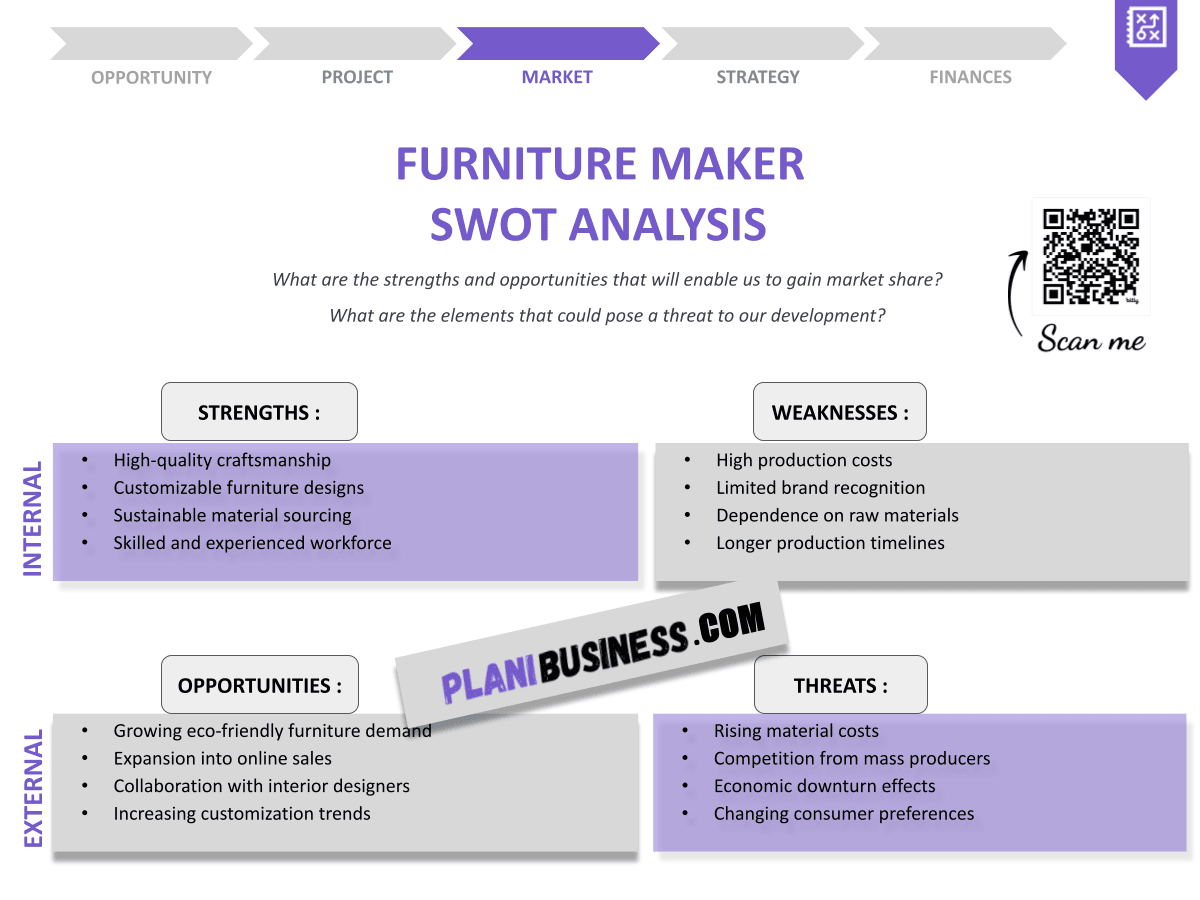Why Should You Have a SWOT Analysis for Your Furniture Business?
Are you thinking about starting a furniture business? You’re not alone! In a world where competition is fierce, a SWOT analysis can be your secret weapon. Did you know that nearly 60% of small businesses fail within the first three years? Having a strategic plan is essential to avoid becoming a statistic. A SWOT analysis, which stands for Strengths, Weaknesses, Opportunities, and Threats, helps you evaluate your business’s internal and external environment. By understanding these factors, you can make informed decisions that will guide your furniture-making venture toward success.
- Understand your unique strengths.
- Identify potential weaknesses to address.
- Explore opportunities for growth in the market.
- Be aware of external threats that could impact your business.
- Learn from real-life examples of successful furniture makers.
- Gain insights into strategic planning methods.
- Discover actionable steps to implement your analysis.
- Enhance your competitive advantage.
- Foster better decision-making processes.
- Create a roadmap for future success.
How Do You Write a SWOT Analysis for a Furniture Business?
Creating a SWOT analysis involves a systematic approach to evaluate your business. Here’s a breakdown of each component:
Strengths
Strengths are the internal characteristics that give your furniture business an advantage. They could include your craftsmanship, brand reputation, or unique designs.
- Quality Craftsmanship: Your ability to create high-quality products can set you apart.
- Customer Loyalty: A strong customer base that trusts your brand can be a significant asset.
- Innovative Designs: Unique designs that resonate with current trends can attract more customers.
- Efficient Production Processes: Streamlined operations can lead to reduced costs and increased profitability.
Weaknesses
Weaknesses are internal factors that could hinder your business’s success. Identifying these can help you mitigate risks.
- Limited Marketing Budget: Not having enough funds for marketing can restrict your outreach.
- Dependency on Local Markets: Relying solely on local sales might limit your growth potential.
- Skill Gaps: Lacking expertise in certain areas can affect product quality.
- Outdated Technology: Falling behind in technology can slow down production and innovation.
Opportunities
Opportunities are external factors that you can leverage to grow your business.
- Emerging Markets: Exploring new markets can provide additional revenue streams.
- Sustainable Materials: Using eco-friendly materials can attract environmentally conscious customers.
- E-commerce Growth: Expanding online can significantly increase your customer base.
- Collaborations: Partnering with interior designers can open new sales channels.
Threats
Threats are external challenges that could negatively impact your business.
- Intense Competition: New entrants in the market can threaten your market share.
- Economic Downturns: Recessions can reduce consumer spending on luxury items like furniture.
- Changing Consumer Preferences: Trends shift rapidly; failing to adapt can lead to lost sales.
- Supply Chain Disruptions: Issues with suppliers can affect your production timelines.
SWOT Example N°1 for XYZ Furniture Co.
XYZ Furniture Co. is a fictional example of a successful furniture maker. Here’s their SWOT analysis:
| SWOT | Analysis |
|---|---|
| Strengths | High-quality craftsmanship |
| Weaknesses | Limited online presence |
| Opportunities | Growing demand for custom pieces |
| Threats | Rising raw material costs |
- Renowned for quality.
- Needs a stronger online presence.
- Custom furniture is in demand.
- Costs of materials are rising.
XYZ Furniture Co. showcases the importance of quality in attracting customers. However, their limited online presence can be a barrier to reaching a wider audience. Addressing this gap could significantly enhance their sales potential.
SWOT Example N°2 for ABC Designs
ABC Designs specializes in modern furniture. Here’s their SWOT analysis:
| SWOT | Analysis |
|---|---|
| Strengths | Unique contemporary designs |
| Weaknesses | High price point |
| Opportunities | Increased interest in minimalism |
| Threats | Economic instability |
- Unique designs attract niche market.
- Higher prices may deter budget-conscious customers.
- Minimalism is trending.
- Economic factors can affect sales.
ABC Designs capitalizes on the trend of minimalism with its unique offerings. However, the higher price point could alienate some customers, especially during economic downturns.
SWOT Example N°3 for Green Home Furniture
Green Home Furniture focuses on eco-friendly products. Here’s their SWOT analysis:
| SWOT | Analysis |
|---|---|
| Strengths | Sustainable sourcing |
| Weaknesses | Limited product range |
| Opportunities | Rising eco-conscious consumers |
| Threats | Competition from cheaper alternatives |
- Strong commitment to sustainability.
- Limited options may restrict customer choice.
- Eco-conscious consumers are on the rise.
- Cheaper alternatives pose a threat.
Green Home Furniture’s commitment to sustainability is a major strength. However, their limited product range might hinder growth, especially as competition increases.
SWOT Example N°4 for Rustic Charm Furnishings
Rustic Charm Furnishings specializes in handmade pieces. Here’s their SWOT analysis:
| SWOT | Analysis |
|---|---|
| Strengths | Customization options |
| Weaknesses | Labor-intensive production |
| Opportunities | Growing trend for handmade goods |
| Threats | Supply chain issues |
- Customization sets them apart.
- Production is labor-intensive.
- Handmade goods are gaining popularity.
- Supply chain disruptions can impact production.
Rustic Charm Furnishings stands out with its customization options, catering to a niche market. Yet, the labor-intensive nature of their production can lead to challenges in meeting demand.
SWOT Example N°5 for Modern Luxe Furniture
Modern Luxe Furniture focuses on luxury items. Here’s their SWOT analysis:
| SWOT | Analysis |
|---|---|
| Strengths | High-end materials |
| Weaknesses | Limited target market |
| Opportunities | Increasing wealth among consumers |
| Threats | Economic downturns |
- High-quality materials attract luxury buyers.
- Limited market can constrain growth.
- Wealthy consumers are increasing.
- Economic factors can limit spending.
Modern Luxe Furniture leverages high-quality materials to attract a wealthy clientele. However, their focus on a niche market can be a double-edged sword, especially in economic downturns.
SWOT Example N°6 for Classic Styles Furniture
Classic Styles Furniture offers timeless designs. Here’s their SWOT analysis:
| SWOT | Analysis |
|---|---|
| Strengths | Timeless appeal |
| Weaknesses | Perceived as outdated |
| Opportunities | Market for vintage furniture |
| Threats | Changing design trends |
- Timeless designs attract traditional buyers.
- Seen as outdated by younger consumers.
- Vintage market is growing.
- Trends can shift rapidly.
Classic Styles Furniture benefits from timeless designs but risks being perceived as outdated. Staying in tune with trends will be crucial to maintain relevance.
SWOT Example N°7 for Urban Living Furniture
Urban Living Furniture targets city dwellers. Here’s their SWOT analysis:
| SWOT | Analysis |
|---|---|
| Strengths | Space-saving designs |
| Weaknesses | High shipping costs |
| Opportunities | Growing urban population |
| Threats | Competition from local stores |
- Space-saving designs are perfect for urban living.
- Shipping costs can cut into profits.
- Urban populations are increasing.
- Local stores pose a threat.
Urban Living Furniture effectively caters to city dwellers with its space-saving designs. However, high shipping costs can be a significant drawback when competing with local stores.
SWOT Example N°8 for Vintage Finds Furniture
Vintage Finds Furniture specializes in retro styles. Here’s their SWOT analysis:
| SWOT | Analysis |
|---|---|
| Strengths | Unique vintage pieces |
| Weaknesses | Sourcing materials can be difficult |
| Opportunities | Rising interest in retro styles |
| Threats | Competition from mass-produced furniture |
- Unique offerings attract vintage lovers.
- Sourcing can be challenging.
- Retro styles are gaining popularity.
- Mass production can overshadow unique pieces.
Vintage Finds Furniture's unique offerings attract a dedicated customer base. Yet, sourcing materials can be a struggle, especially with increased competition.
SWOT Example N°9 for Family Furniture Co.
Family Furniture Co. focuses on family-friendly designs. Here’s their SWOT analysis:
| SWOT | Analysis |
|---|---|
| Strengths | Durable and practical designs |
| Weaknesses | Limited luxury options |
| Opportunities | Growing market for family furniture |
| Threats | Economic shifts affecting families |
- Durable designs attract families.
- Limited luxury options may deter some buyers.
- Family market is expanding.
- Economic shifts can impact sales.
Family Furniture Co. excels in providing practical designs for families. However, the lack of luxury options could limit their appeal to a broader audience.
SWOT Example N°10 for Tech-Integrated Furniture
Tech-Integrated Furniture combines technology with design. Here’s their SWOT analysis:
| SWOT | Analysis |
|---|---|
| Strengths | Innovative tech features |
| Weaknesses | High production costs |
| Opportunities | Growing demand for smart furniture |
| Threats | Rapid technological changes |
- Innovative features attract tech-savvy customers.
- High costs can limit market reach.
- Demand for smart furniture is increasing.
- Tech changes can lead to obsolescence.
Tech-Integrated Furniture leads with innovation but faces challenges with high production costs. Adapting to technological changes will be vital for long-term success.
Conclusion
In conclusion, conducting a Furniture Maker SWOT Analysis is essential for understanding your business’s position in the market. By identifying your strengths, weaknesses, opportunities, and threats, you can craft a strategic plan that aligns with your goals. This analysis not only helps you navigate challenges but also empowers you to seize opportunities that can propel your business forward. To take your planning to the next level, consider using a business plan template for Furniture Makers that can guide you through the essentials of starting and running your venture successfully. Additionally, you can explore our articles on How to Create a Furniture Maker Business? and How to Plan a Furniture Maker Marketing Strategy? With Example for more insights and actionable advice.
FAQ
What is a SWOT analysis?
A SWOT analysis is a strategic tool that helps businesses identify their strengths, weaknesses, opportunities, and threats in the market.
Why is SWOT analysis important for furniture makers?
It provides valuable insights into your market position, enabling furniture makers to make informed decisions and enhance their business strategy.
How do I conduct a SWOT analysis?
Gather a team to brainstorm and categorize findings into strengths, weaknesses, opportunities, and threats to develop a comprehensive analysis.
What are some common strengths for furniture businesses?
Quality craftsmanship, strong brand reputation, and innovative designs are typical strengths in the furniture industry.
Can a SWOT analysis help with marketing strategies?
Yes, it can highlight areas of focus for effective marketing and outreach within the furniture market.
How often should I update my SWOT analysis?
Regular reviews, at least annually or when significant changes occur, are beneficial to maintain an accurate understanding of your business environment.
What if I have more weaknesses than strengths?
Focus on addressing your weaknesses while leveraging your strengths to improve overall business performance.
Are there any tools to help with SWOT analysis?
Many online templates and software can assist in creating a structured SWOT analysis for your furniture business.
How do I turn opportunities into actionable plans?
Prioritize opportunities based on their potential impact and set specific goals to pursue them effectively.
What threats should I be aware of in the furniture industry?
Monitor factors such as competition, economic fluctuations, and changing consumer preferences that could affect your business.







